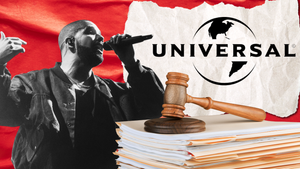Drake’s legal team have already vowed to appeal yesterday’s judgement in the New York courts dismissing his defamation lawsuit against Universal Music in relation to Kendrick Lamar’s diss track hit ‘Not Like Us’.
Judge Jeanette A Vargas wrote in her ruling yesterday that Drake’s litigation centered on whether or not the lyrics of Lamar’s track “can reasonably be understood to convey as a factual matter that Drake is a pedophile or that he has engaged in sexual relations with minors”. But, “in light of the overall context in which the statements in the recording were made, the court holds that it cannot”.
Vargas also dismissed claims that Universal employed dodgy marketing tactics to boost the popularity of ‘Not Like Us’ in ways that violated New York business laws. Those claims, she said, were mainly based on online rumours, and even if the dodgy tactics had been employed, Drake’s team failed to show how consumers had been harmed, which would be necessary in the context of the relevant New York laws.
A statement issued by Drake’s team shortly after yesterday's judgement was short and simple. It said, “we intend to appeal today’s ruling and we look forward to the court of appeals reviewing it”.
‘Not Like Us’ was the stand out from a series of diss tracks released during a rap beef between Drake and Lamar in spring 2024. In it, Lamar accuses Drake of being a pedophile. Drake subsequently sued Universal, his own long-term label partner, accusing the major of defamation over its role in releasing and marketing Lamar’s track.
It always seemed like an ambitious legal claim and Universal was disparaging of the litigation from the start, portraying Drake as a sore loser in a rap battle won by a rival rapper. And while Lamar’s lyrics in ‘Not Like Us’ might dub Drake a “certified pedophile”, in the context of a diss track and rap beef - it insisted - that can’t be considered defamation.
Vargas agrees. Noting that under the laws of New York “expressions of opinion” cannot be defamatory, in her ruling the judge sets out criteria for assessing whether a statement should be considered fact or opinion.
Most relevant, she says, is that “the full context of the communication” and the “surrounding circumstances” must be considered, as they might signal to listeners that a statement “is likely to be opinion, not fact”.
With a diss track, she goes on, “the average listener is not under the impression” that what they are listening to “is the product of a thoughtful or disinterested investigation, conveying to the public factchecked verifiable content”.
And this diss track was released as part of a “heated public feud” in which both participants “exchanged progressively caustic, inflammatory insults and accusations”, Vargas adds.
Meaning this is “precisely the type of context in which an audience may anticipate the use of ‘epithets, fiery rhetoric or hyperbole’ rather than factual assertions”.
The judge also notes that the lines in ‘Not Like Us’ that accuse Drake of being a pedophile were in essence a response to lyrics in a track Drake put out earlier in the beef. In his track ‘Taylor Made Freestyle’, Drake has an AI-generated Tupac address Lamar, rapping “Talk about him likin young girls, that’s a gift from me, heard it on the Budden podcast, it’s gotta be true”.
Drake’s reps argued that the lyrics in ‘Not Like Us’ should be treated in isolation, because the track became such a big hit it was consumed much more widely, by people who were not aware of the wider beef and what was said in other tracks released during that back and forth.
But Vargas disagrees. ‘Not Like Us’ “cannot be viewed in isolation but must be placed in its appropriate factual context”, she says. Not least because, when Lamar wrote the lyrics to ‘Not Like Us’, in part responding to ‘Taylor Made Freestyle’, he did not and could not have anticipated that that particular track would gain so much momentum.
Drake’s team also argued that Universal continued to heavily promote ‘Not Like Us’ once it was apparent that the track was bigger that the rap beef from which it originated, and therefore - if nothing else - the major’s conduct during that later period of promotion should expose it to liability for defamation.
“This argument is logically incoherent”, Vargas writes. “If the recording was non-actionable opinion at the time it was initially produced, then its republication would not expose UMG to liability. Republication cannot transform Lamar’s statement of opinion into UMG’s statement of fact”.
Given Drake’s defamation claim against Universal always seemed ambitious, his allegations that the major employed dodgy tactics to promote ‘Not Like Us’ - including payola and stream manipulation - were in many ways more interesting. The employment of such tactics would be damaging in reputation terms for Universal, in addition to any potential legal liabilities.
However, Vargas concludes that those allegations stem from “what boils down to unreliable online commentary”. And even if the allegations could be proven, Drake’s team hadn’t convincingly argued why Universal would have breached the specific New York business laws cited in his lawsuit. Which is why that element of the lawsuit was also dismissed.

